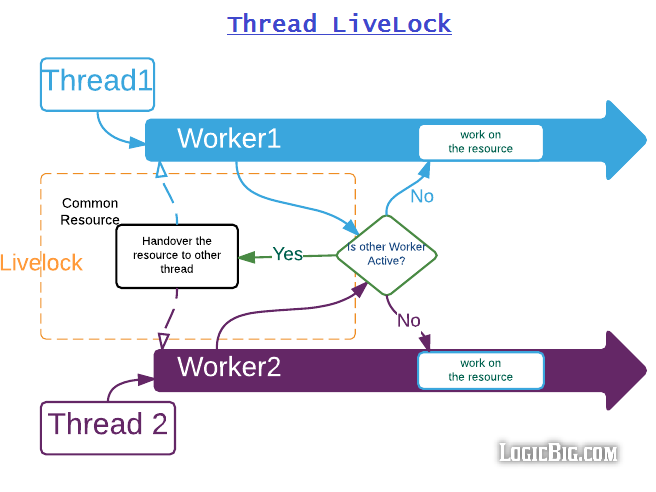A livelock is a recursive situation where two or more threads would keep repeating a particular code logic. The intended logic is typically giving opportunity to the other threads to proceed in favor of 'this' thread.
A real-world example of livelock occurs when two people meet in a narrow corridor, and each tries to be polite by moving aside to let the other pass, but they end up swaying from side to side without making any progress because they both repeatedly move the same way at the same time.
From Oracle reference docs:
A thread often acts in response to the action of another thread. If the other thread's action is also a response to the action of another thread, then livelock may result. As with deadlock, livelocked threads are unable to make further progress. However, the threads are not blocked - they are simply too busy responding to each other to resume work.
For example consider a situation where two threads want to access a shared common resource via a Worker object but when they see that other Worker (invoked on another thread) is also 'active', they attempt to hand over the resource to other worker and wait for it to finish. If initially we make both workers active they will suffer from livelock.

The Common Resource Class
public class CommonResource {
private Worker owner;
public CommonResource (Worker d) {
owner = d;
}
public Worker getOwner () {
return owner;
}
public synchronized void setOwner (Worker d) {
owner = d;
}
}
The Worker Class
public class Worker {
private String name;
private boolean active;
public Worker (String name, boolean active) {
this.name = name;
this.active = active;
}
public String getName () {
return name;
}
public boolean isActive () {
return active;
}
public synchronized void work (CommonResource commonResource, Worker otherWorker) {
while (active) {
// wait for the resource to become available.
if (commonResource.getOwner() != this) {
try {
wait(10);
} catch (InterruptedException e) {
//ignore
}
continue;
}
// If other worker is also active let it do it's work first
if (otherWorker.isActive()) {
System.out.println(getName() +
" : handover the resource to the worker " +
otherWorker.getName());
commonResource.setOwner(otherWorker);
continue;
}
//now use the commonResource
System.out.println(getName() + ": working on the common resource");
active = false;
commonResource.setOwner(otherWorker);
}
}
}
The main class
public class Livelock {
public static void main (String[] args) {
final Worker worker1 = new Worker("Worker 1 ", true);
final Worker worker2 = new Worker("Worker 2", true);
final CommonResource s = new CommonResource(worker1);
new Thread(() -> {
worker1.work(s, worker2);
}).start();
new Thread(() -> {
worker2.work(s, worker1);
}).start();
}
}
Output:
There will be never ending recursion of the following output:
Worker 1 : handing over the resource to the worker: Worker 2
Worker 2 : handing over the resource to the worker: Worker 1
Worker 1 : handing over the resource to the worker: Worker 2
Worker 2 : handing over the resource to the worker: Worker 1
Worker 1 : handing over the resource to the worker: Worker 2
Worker 2 : handing over the resource to the worker: Worker 1
........
Avoiding Livelock
In above example we can fix the issue by processing the common resource sequentially rather than in different threads simultaneously.
Just like deadlock, there's no general guideline to avoid livelock, but we have to be careful in scenarios where we change the state of common objects also being used by other threads, for example in above scenario. the Worker object.
Example ProjectDependencies and Technologies Used:
|